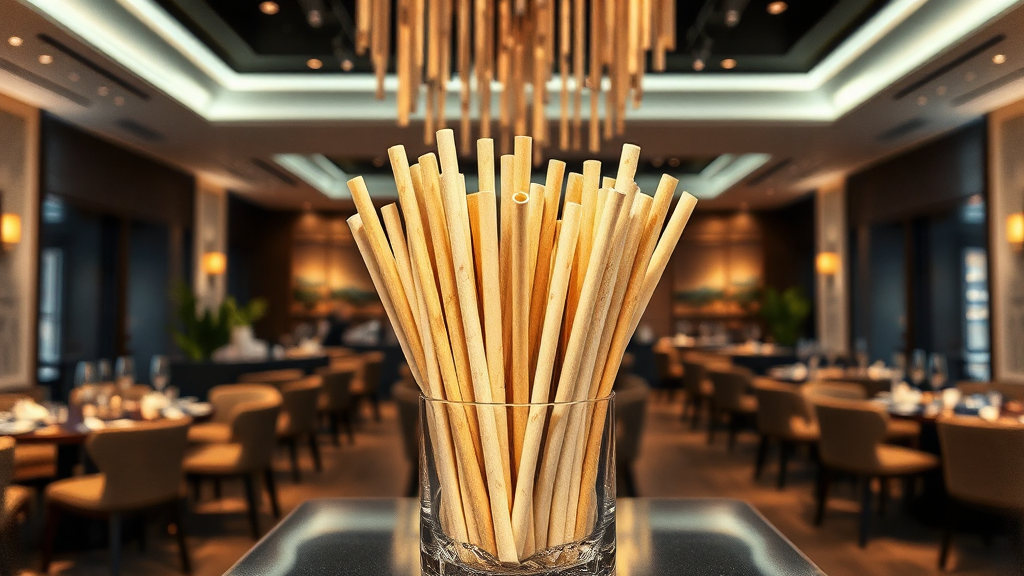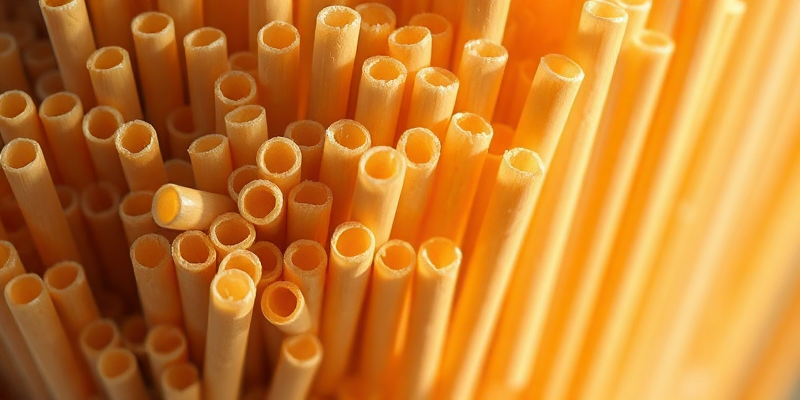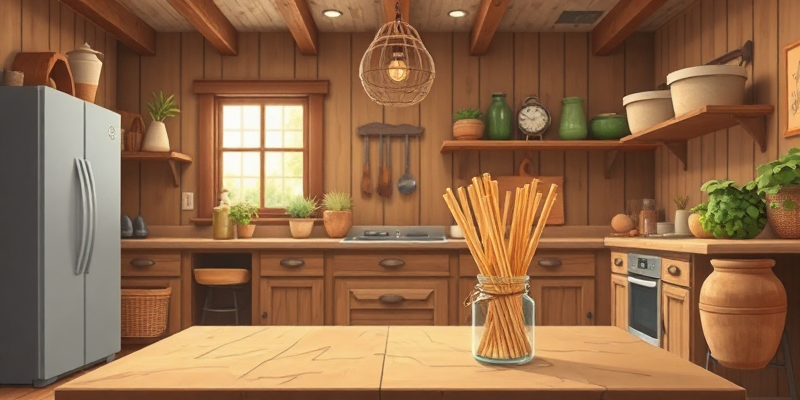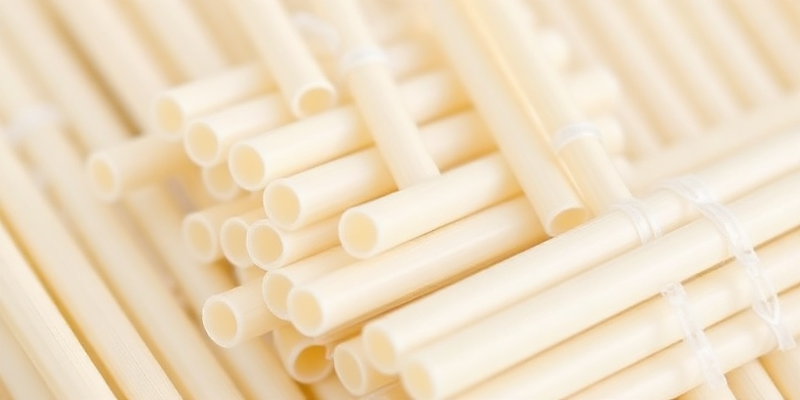Sustainable B2B Solutions: Biodegradable Sugarcane Straws for Plastic Waste Reduction

Introduction: The Rise of Sustainable Alternatives in a Plastic-Banning World

Picture this: It’s a busy Friday afternoon at your restaurant chain’s flagship location. A young family sits down, and before even looking at the menu, they ask your server about sustainable practices. Specifically, they want to know if you’re still using plastic straws. This scenario is becoming increasingly common acros the globe as consumer consciousnes shifts dramatically toward environmental responsibility.
With over 60 countries having implemented some form of single-use plastic restriction and an estimated 500 million plastic straws being used daily in the US alone, businesses face mounting pressure to adopt sustainable alternatives. These aren’t just feel-good initiatives anymore—they’re becoming legal necessities in many markets.
Explore how biodegradable sugarcane straws are revolutionizing busines sustainability practices as regulatory landscapes transform worldwide. Unlike traditional plastic straws that linger in our environment for centuries, biodegradable sugarcane straws offer a compelling solution that aligns with both consumer expectations and emerging regulations.
The challenge for many businesses isn’t whether to make the switch, but how to do so without compromising on quality, customer experience, or operational efficiency. Today’s B2B buyers need solutions that don’t just tick the “eco-friendly” box but actually work in real-world busines environments—from high-volume quick-service restaurants to luxury hotels where presentation matters as much as performance.
Biodegradable sugarcane straws represent one of the most promising alternatives available today. They’re made from bagasse, the fibrous byproduct left after extracting juice from sugarcane stalks—transforming what would be agricultural waste into a valuable, sustainable product. These straws don’t just minimize environmental impact; they actively repurpose materials that would otherwise be discarded.
As we explore the world of biodegradable sugarcane straws, we’ll unpack their regulatory advantages, real-world performance comparisons, busines benefits, environmental credentials, and practical applications. Whether you’re a hospitality group seeking compliance with new regulations, a distributor looking to expand your sustainable product line, or a food service busines wanting to meet growing customer expectations, the following insights will help you navigate this transition confidently.
Regulatory Compliance: Certifications That Keep Your Busines Ahead of the Curve

Navigating the regulatory landscape for food service products can feel like walking through a minefield, especially as sustainability regulations tighten globally. According to the Environmental Protection Agency, businesses can face fines up to $93,750 per day for non-compliance with certain environmental regulations in the United States alone.
Biodegradable sugarcane straws offer a significant advantage in this arena, particularly those with proper certifications. When sourcing these products, look specifically for:
- **FDA Certification**: Ensures the product meets food safety standards for direct contact with beverages and foods
- **LFGB Certification**: The German food safety standard, often considered more stringent than FDA requirements
- **Home Compostability Certification**: Verifies the product will biodegrade in home composting conditions
- **Industrial Compostability Certification**: Ensures breakdown in commercial composting facilities
Learn about the comprehensive wholesale solutions available for sustainable hospitality businesses seeking to navigate these regulatory requirements efficiently. Many hotel chains have discovered that properly certified biodegradable sugarcane straws eliminate compliance headaches while satisfying eco-conscious guests.
Consider the case of Coastal Resorts Group, which faced potential fines in three different municipalities after local plastic straw bans went into effect. By switching to certified biodegradable sugarcane straws, they not only achieved immediate compliance but also gained marketing advantages by promoting their sustainable practices to environmentally conscious travelers.
Remember that regulations vary significantly between regions, with some areas requiring specific certifications for compostable products. Working with suppliers who understand these nuances and provide properly documented products saves tremendous administrative burden and potential legal complications down the road.
How Biodegradable Sugarcane Straws Compare to Other Eco Alternatives

When evaluating sustainable straw options, decision-makers need practical comparisons beyond just environmental claims. A 2022 industry analysis found that businesses switching to biodegradable alternatives save an average of 17% on waste management costs due to reduced volume and processing requirements.
Discover why sugarcane straws are emerging as the preferred choice for forward-thinking businesses after conducting thorough comparative analyses. Here’s how they stack up against other popular alternatives:
| Característica | Biodegradable Sugarcane Straws | Pajitas de papel | PLA (Corn-Based) Straws | Reusable Metal/Glas Straws |
|---|---|---|---|---|
| ——— | ——————————– | ————– | ————————- | —————————- |
| Durability in Drinks | 2-4 hours without softening | 30-60 minutes before softening | 1-2 hours before warping in hot drinks | Indefinite |
| Compostability | Home and industrial compostable (30-90 days) | Home and industrial compostable (30-90 days) | Industrial compostable only (90-180 days) | Not compostable |
| Feel/Customer Experience | Natural texture, neutral taste | Paper texture, can affect drink taste | Similar to plastic | Cold/hard, requires cleaning |
| Operational Considerations | Direct replacement for plastic | May require double-straws for thick drinks | Temperature sensitive | Requires washing system and theft prevention |
| Cost Comparison | Mid-range | Low-mid range | Mid-range | High initial investment, low long-term cost |
| Customizability | Moderate | Alto | Moderate | Limited |
The United Nations Environment Programme has extensively studied alternative materials for single-use products, noting that context-specific solutions typically outperform one-size-fits-all approaches. Their analysis of plastic alternatives emphasizes the importance of considering full lifecycle impacts.
Sugarcane straws win particularly in hospitality settings where customer experience is paramount—they don’t become soggy like paper or alter drink taste, yet they offer genuinely sustainable end-of-life options unlike many bioplastics that require special processing facilities rarely available in most regions.
Top Busines Benefits of Switching to Biodegradable Sugarcane Straws

Beyond environmental considerations, biodegradable sugarcane straws offer compelling busines advantages that directly impact your bottom line. A recent hospitality industry survey revealed that 73% of businesses reported improved customer satisfaction scores after switching to high-quality sustainable alternatives.
Explore comprehensive B2B solutions for implementing sugarcane straws acros your operations with minimum disruption and maximum benefit. Businesses consistently report these key advantages:
**Enhanced Brand Perception:** Today’s consumers actively seek businesses that demonstrate environmental responsibility. By prominently featuring your use of biodegradable sugarcane straws, you signal genuine commitment rather than greenwashing. This translates to improved social media mentions, better reviews, and stronger customer loyalty.
**Operational Simplicity:** Unlike some eco-alternatives that require special handling or disposal protocols, biodegradable sugarcane straws integrate seamlessly into existing operations. They don’t require staff retraining or separate waste streams, making implementation virtually frictionles.
**Cost Stabilization:** While plastic straws might seem cheaper initially, their costs are rising unpredictably due to increasing petroleum prices and plastic taxes emerging worldwide. Biodegradable sugarcane straws offer more stable pricing since they’re derived from renewable agricultural byproducts rather than fossil fuels.
**Marketing Differentiation:** For distributors and wholesalers, offering certified sustainable options like biodegradable sugarcane straws creates new sales opportunities with eco-conscious clients. For end-use businesses, these products become effective talking points in marketing materials and social responsibility reports.
**Regulatory Future-Proofing:** By adopting biodegradable sugarcane straws now, businesses position themselves ahead of inevitable regulatory changes, avoiding scrambling transitions when new restrictions appear.
The return on investment becomes particularly evident when considering the full cost picture—including potential fines, consumer backlash against plastic use, and the marketing value of sustainable practices—making biodegradable sugarcane straws a financially sound choice for forward-thinking businesses.
Environmental Impact: Why Biodegradable Sugarcane Straws Win

The environmental advantages of biodegradable sugarcane straws extend far beyond simply avoiding plastic pollution. According to lifecycle assessment studies, switching from plastic to sugarcane straws can reduce carbon footprint by up to 80% when considering production, transportation, and end-of-life impacts.
Discover optimal sustainable straw solutions for event planning businesses looking to minimize environmental impact without compromising on guest experience. The environmental benefits are multifaceted:
**Circular Economy in Action:** Sugarcane straws represent perfect circular economics—transforming agricultural waste (bagasse) into valuable products that eventually return to the soil as compost. This closed-loop system stands in stark contrast to the linear take-make-dispose model of plastic straws.
**Reduced Ocean Impact:** Marine conservation organizations have documented over 500 marine species directly impacted by plastic straw pollution. Biodegradable sugarcane straws naturally break down if they do reach waterways, significantly reducing harm to marine ecosystems.
**Carbon Sequestration:** Growing sugarcane actively removes carbon from the atmosphere, and when sugarcane byproducts are transformed into durable products, that carbon remains sequestered rather than being immediately released through burning or decomposition.
**Water Conservation:** Compared to paper straw production, which requires significant water inputs, sugarcane straw manufacturing typically uses 60% les water—a critical consideration as water stres increases globally.
When implemented acros a large busines operation, these environmental benefits scale dramatically. A mid-sized restaurant chain switching to biodegradable sugarcane straws can prevent several tons of plastic waste annually while significantly reducing its carbon footprint—tangible results that resonate with environmentally concerned stakeholders.
Case Study: Biodegradable Sugarcane Straws Succes in Action

Explore specialized eco-friendly cocktail straw solutions for bars and restaurants based on real-world implementation succes stories. The experience of Coastal Breeze Resort Group demonstrates the multifaceted benefits of switching to biodegradable sugarcane straws.
This hospitality group operates 12 beachfront properties acros three states and faced increasing pressure from both regulations and guests regarding plastic use. After testing multiple sustainable alternatives, they selected biodegradable sugarcane straws for implementation acros all properties.
The results proved remarkable:
- **Customer Satisfaction:** Post-implementation surveys showed a 27% increase in positive comments about the company’s environmental practices
- **Operational Efficiency:** Unlike paper alternatives they had tested, sugarcane straws eliminated complaints about straws dissolving in drinks or affecting taste
- **Regulatory Compliance:** Successfully met plastic straw bans in all operating jurisdictions without requiring exemptions
- **Cost Management:** Despite a 3.5¢ per unit premium over conventional plastic straws, overall costs increased by only 0.02% while delivering significant marketing and compliance value
- **Waste Reduction:** Total waste volume decreased by 4.7% due to the compostability of the straws, reducing waste hauling costs
The group’s sustainability director noted: “We expected to take a financial hit to meet environmental goals, but the biodegradable sugarcane straws actually created value beyond their cost premium through improved guest experience and marketing advantages.”
This example illustrates how biodegradable sugarcane straws can deliver busines benefits alongside environmental advantages when implemented thoughtfully as part of a comprehensive sustainability strategy.
Preguntas frecuentes
- What minimum order quantities should we expect for wholesale biodegradable sugarcane straws?
- Typical MOQs start at 10,000 units for standard sizes and designs, though customized options may require higher minimums around 25,000-50,000 units. We can work with businesses of various sizes to find appropriate scaling solutions that match your volume needs.
- How do biodegradable sugarcane straws perform with hot beverages?
- Unlike paper alternatives that quickly deteriorate or PLA straws that can warp, high-quality biodegradable sugarcane straws maintain structural integrity in hot beverages for 2-4 hours. They’re suitable for coffee, tea, and other hot drinks up to 190°F (88°C).
- What customization options are available for biodegradable sugarcane straws?
- Discover FDA-certified large-format straw options with customization capabilities for businesses with specific branding requirements. Options include custom diameters (5-12mm), lengths (5-10 inches), color variations using natural dyes, and even subtle branding through embossing techniques on premium orders.
- How do we verify the environmental claims of biodegradable sugarcane straws for our corporate sustainability reporting?
- Reputable suppliers provide certification documentation including compostability testing results, lifecycle analysis reports, and raw material sourcing verification. These documents support your ESG reporting requirements and sustainability claims verification.
- What’s the shelf life of biodegradable sugarcane straws?
- When stored in proper conditions (cool, dry environment in sealed packaging), biodegradable sugarcane straws maintain quality for 2-3 years. Unlike some bioplastic alternatives, they don’t degrade prematurely during normal storage periods.
- How should we dispose of biodegradable sugarcane straws in our busines operations?
- For optimal environmental benefit, direct home or industrial composting is recommended. However, they’ll still biodegrade significantly faster than conventional plastics even in landfill conditions. Many businesses implement simple collection systems to aggregate compostable items.
- Are biodegradable sugarcane straws more expensive than conventional plastic straws?
- While unit costs are typically 2-4¢ higher than conventional plastic straws, many businesses find the total value proposition favorable when considering customer preference, regulatory compliance, and marketing benefits. Volume discounts can significantly reduce the premium, especially for consistent, large-scale orders.







